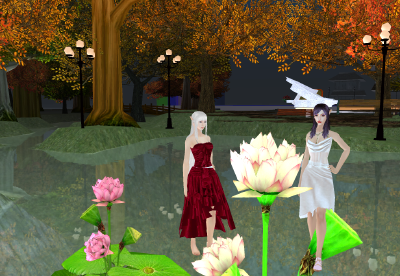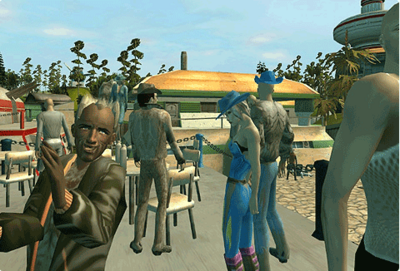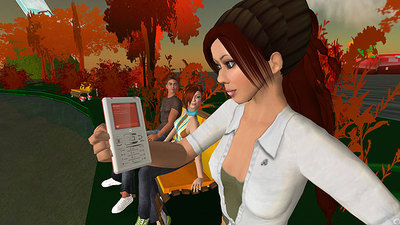Author: Stuart Dredge
VWFE: Spotlight on five hot new virtual worlds

This is one of the sessions at the Virtual Worlds Forum Europe that I’ve most been looking forward to: five new virtual worlds pitching their wares, or at least introducing themselves. It should be a glimpse at the next generation of virtual worlds, and a chance to see where all this is heading.
So, we start with…
1. HiPiHi (link)
It’s pronounced High-Pee-High by the way, and has been tagged as ‘the Chinese Second Life’, being based in Beijing. “Previously, there’s been no virtual world that’s really catered for the Chinese market and targeted their language barriers,” says presenter Bjorn Lee. “Our vision is to create a virtual world and virtual economy.”
VWFE: How do virtual worlds make money anyway?
Right, time for a panel session at Virtual Worlds Forum Europe, on business models. In other words, where’s the dosh coming from? Moderator Corey Bridges of The Multiverse Network is kicking things off by saying virtual world companies can learn a lot from games like World of Warcraft and Lineage, because they’re making shedloads of money (I paraphrase, obviously).
Thomas Bidaux from NCSoft Europe is first up, and they make massively multiplayer online games (MMOGs), so he should know that area well (Lineage and Guild Wars are among their games). The company’s most common model is subscription, where people pay a monthly fee to play a game.
VWFE: IBM on why virtual worlds need to be interoperable
 up at the Virtual Worlds Forum Europe is Paul Ledak, who’s one of IBM’s virtual world gurus. He’s explaining the important (if you’re in the virtual worlds business) of interoperability.
up at the Virtual Worlds Forum Europe is Paul Ledak, who’s one of IBM’s virtual world gurus. He’s explaining the important (if you’re in the virtual worlds business) of interoperability.
He’s kicking off with a personal example: creating a house in a virtual world, with an eye to building it in real life (I think). So, you start with a 2D floorplan design, and have to turn that into a 3D form – maybe via an architect who visualises it for you, in partnership with an interior designer. “At the end of the day, there are many different people involved in putting this together.”
VWFE: BP on how businesses can make the most of virtual worlds
 It’s the second day of the Virtual Worlds Forum Europe conference, so I’m here reporting on all the discussion and debate. There’s a fair amount of sessions on corporate and legal issues today, but also some exciting stuff on new virtual worlds, and the future. Sorry, The Future.
It’s the second day of the Virtual Worlds Forum Europe conference, so I’m here reporting on all the discussion and debate. There’s a fair amount of sessions on corporate and legal issues today, but also some exciting stuff on new virtual worlds, and the future. Sorry, The Future.
First up is Joe Little from BP, who’s talking about ‘evangelising virtual worlds within the corporation’. In other words, convincing your boss why he shouldn’t be scared of Second Life. Apparently BP is gearing up to make the most of the 3D Web / metaverses (they’re still deciding what term to use) next year.
VWFE: The thing I don't get about Vodafone's 'Inside Out' Second Life tech
I could be being really dumb here, or it could be an Emperor’s New Clothes moment. You decide. Vodafone’s David Erixon has been on-stage at Virtual Worlds Forum Europe talking about the operator’s Second Life activities, including its new ‘Inside Out’ tech.
Basically, it’s a heads up display within Second Life that lets you make voice calls and send texts to friends real-world mobile phones, and vice versa. Around 10,000 have been distributed, says Erixon, which is pretty successful by Second Life standards.
Lord Puttnam: "Broadcasters not engaging enough with virtual worlds"
Film industry veteran Lord Puttnam delivered the keynote address at this morning's Virtual Worlds Forum Europe conference, and had some stern words for broadcasters, who he says aren't engaging enough with virtual reality. "Broadcast media is beginning to look rather…
VWFE: How popular are virtual worlds anyway?
More from the Virtual Worlds Forum Europe, where we're having a session giving the full statistical skinny on the area. Jess Mulligan from Cyber Sports is giving the definition side of things, before Paul Jackson from Forrester Research gets busy with the stats.
First Jess. There's as little as 10% crossover between online games and social spaces (e.g. World of Warcraft vs Second Life), so they're really separate areas – despite the fact that many people who don't use either confuse the two.






















